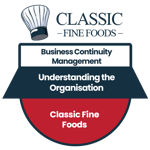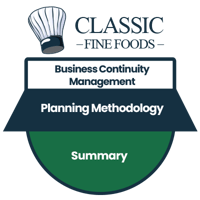Implementing Business Continuity: A Step-by-Step Guide for Classic Fine Foods Malaysia
Chapter 4
What Are the Risks to Classic Fine Food Malaysia Concerning BCM?
Introduction
The stakes are exceptionally high for Classic Fine Foods (CFF) Malaysia, a leading provider of premium food products and services.
 The company operates in a highly competitive industry where customer expectations, supply chain dependencies, and regulatory requirements constantly evolve.
The company operates in a highly competitive industry where customer expectations, supply chain dependencies, and regulatory requirements constantly evolve.
This chapter explores the key risks to CFF Malaysia concerning Business Continuity Management (BCM) and highlights the importance of proactive risk identification and mitigation.
Supply Chain Disruptions
Dependence on Global Suppliers
CFF Malaysia relies heavily on a global network of suppliers to source high-quality ingredients and products.
Any disruption in the supply chain—whether due to geopolitical tensions, natural disasters, or pandemics—can have a cascading effect on CFF Malaysia’s ability to deliver products to its customers.
For instance, a delay in the shipment of speciality cheeses or wines from Europe could result in stockouts, leading to lost sales and damaged customer relationships.
Logistics and Transportation Risks
The company’s operations are also vulnerable to disruptions in logistics and transportation. Port closures, strikes, or fuel shortages can delay the delivery of goods, while accidents or breakdowns in transportation can spoil perishable items.
Given the perishable nature of many of its products, these risks are particularly acute for CFF Malaysia.
Operational Risks
Equipment Failures
CFF Malaysia’s operations depend on specialised equipment, from refrigeration units to food processing machinery.
A sudden breakdown of critical equipment could halt production, leading to delays in fulfilling customer orders.
The company risks significant downtime and financial losses without a robust maintenance schedule and contingency plans.
IT System Outages
In an increasingly digital world, IT systems are crucial in managing inventory, processing orders, and communicating with suppliers and customers.
A cyberattack, hardware failure, or software glitch could disrupt these systems, leading to operational inefficiencies and potential data breaches.
An IT outage could be particularly damaging for CFF Malaysia, which relies on real-time data to manage its supply chain.
Regulatory and Compliance Risks
Food Safety Regulations
The food industry is subject to stringent regulations to ensure product safety and quality.
Failure to comply with these regulations—whether due to contamination, mislabeling, or improper storage—can result in fines, product recalls, and reputational damage.
A lapse in food safety could have long-lasting consequences for CFF Malaysia, which prides itself on offering premium products.
Import/Export Restrictions
As a company that sources products from around the world, CFF Malaysia is also vulnerable to changes in import/export regulations.
Tariffs, trade barriers, or changes in customs procedures can increase costs and delay shipments, impacting the company’s ability to meet customer demand.
Reputational Risks
Brand Image
A company’s reputation is one of its most valuable assets in the food industry.
Any incident that tarnishes the brand—whether a food safety issue, a customer complaint, or a social media scandal—can lead to loss of customer trust and loyalty.
For CFF Malaysia, which caters to a discerning clientele, maintaining a pristine brand image is critical to its success.
Customer Expectations
Today’s customers expect high-quality products, seamless service, and transparency.
Any failure to meet these expectations—whether due to a delayed delivery, a product defect, or poor customer service—can result in negative reviews and a loss of business.
In an era where social media amplifies customer voices, the impact of such incidents can be magnified.
Environmental and Natural Disaster Risks
Climate Change
Climate change poses a significant risk to CFF Malaysia’s operations. Extreme weather events, such as floods, hurricanes, or droughts, can disrupt supply chains, damage infrastructure, and lead to crop failures.
These events can result in increased costs, reduced availability of key ingredients, and production delays.
Pandemics and Health Crises
The COVID-19 pandemic has underscored businesses' vulnerability to health crises.
For CFF Malaysia, a pandemic could lead to workforce shortages, supply chain disruptions, and changes in consumer behaviour.
The company must be prepared to adapt to such challenges, whether by implementing remote work policies, diversifying suppliers, or adjusting its product offerings.
Financial Risks
Currency Fluctuations
CFF Malaysia is exposed to currency fluctuations as a company that sources products worldwide.
A sudden depreciation of the Malaysian ringgit could increase the cost of imported goods, squeezing profit margins.
Conversely, a strong ringgit could make the company’s products less competitive internationally.
Economic Downturns
Economic downturns can reduce consumer spending, particularly on premium products. For CFF Malaysia, which caters to a high-end market, a recession could result in lower sales and increased pressure to reduce prices.
The company must be prepared to navigate such economic challenges by diversifying its product range, exploring new markets, or implementing cost-saving measures.
Summing Up ...
The risks to CFF Malaysia concerning Business Continuity Management are multifaceted and interconnected.
The company must identify and mitigate potential threats, from supply chain disruptions and operational failures to regulatory challenges and reputational risks.
By implementing a robust BCM framework, CFF Malaysia can enhance its resilience, protect its brand, and ensure the continuity of its operations in the face of adversity.
This chapter is the second part of the eBook "Driving Business Continuity: Implementing BCM for Classic Fine Foods Malaysia." eBook 2 is titled "Implementing Business Continuity: A Step-by-Step Guide for Classic Fine Foods Malaysia", which provides a comprehensive guide to implementing a BCM system in alignment with ISO 22301
| Driving Business Continuity: Implementing BCM for Classic Fine Foods Malaysia | |||||
| Implementing Business Continuity: A Step-by-Step Guide for Classic Fine Foods Malaysia | |||||
 |
 |
 |
 |
 |
 |
 |
 |
 |
 |
 |
 |
More Information About Business Continuity Management Courses




![Register [BL-B-3]*](https://blog.bcm-institute.org/hs-fs/hubfs/hub_generated/resized/19a8306f-6b76-45ff-8585-95111f393aeb.png?width=200&height=56&name=19a8306f-6b76-45ff-8585-95111f393aeb.png)



![FAQ [BL-B-3]](https://blog.bcm-institute.org/hs-fs/hubfs/hub_generated/resized/9b7f5669-8ad6-450b-a98f-5f5d49ebfc8e.png?width=150&height=150&name=9b7f5669-8ad6-450b-a98f-5f5d49ebfc8e.png)
![Email to Sales Team [BCM Institute]](https://blog.bcm-institute.org/hs-fs/hubfs/hub_generated/resized/83ae9ad3-affc-416e-8f51-64218d6d98f2.png?width=100&height=100&name=83ae9ad3-affc-416e-8f51-64218d6d98f2.png)





